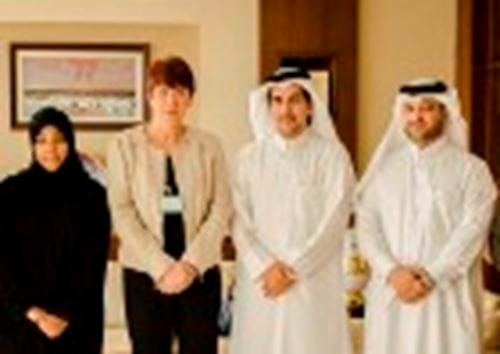Risks, research and ‘reservoirs’ on the agenda in Qatar
10th April 2014

Pioneering work in the field of carbon capture and storage, research priorities, changes in education and process safety were all on the agenda last month as senior members of the Institution of Chemical Engineers (IChemE) visited Qatar in the Middle East.
Qatargas and Maersk Oil Qatar hosted the visit which included representatives from Texas A&M University, Imperial College London, Qatar National Research Fund, Shell, Qatar University, Qatar Petroleum, and Qatar Environment and Energy Research Institute.
IChemE president, Judith Hackitt, and deputy president, professor Geoff Maitland, contributed to the wide-ranging discussions which included a workshop on industrial carbon capture, utilisation and storage.
The visit also included a tour of Qatar’s Ras Laffan Industrial City unit which covers 295 square kilometres and houses the world’s largest complex of liquefied natural gas plants and the biggest port for LNG exports on the globe. The gas facilities within its grounds produce almost a third of the world’s LNG exports.
Judith Hackitt, who was invited to speak as part of the hosts’ lecture series entitled ‘Research in the World’, said: “There is no doubt that we as chemical engineers have a vital role to play in finding solutions to some of the major challenges facing our planet. Our core strength in ‘systems thinking’ enables us to work with other disciplines and to ensure that what we propose fits in the wider business context.
“New technologies will always bring new risks and we cannot eliminate them, nor can we avoid taking the big steps by being too risk averse. We must learn to identify and manage the risks at the same time as we push forward with exciting new innovations across the whole spectrum of chemical engineering.”
Geoff Maitland outlined the work of the Qatar Carbonates and Carbon Storage Research Centre (QCCSRC), which was established at Imperial College London in 2008 and is a ten year $70m programme to provide the science and engineering underpinning the cost-effective, safe, permanent storage of CO2 in carbonate reservoirs.
He said: “Engineers and the energy sector need to take responsibility for reducing CO2 emissions and halt the damage climate change is doing to our planet. QCCSRC – with the support of its partners Shell, Qatar Petroleum and Qatar Science and Technology Park – is undertaking important and pioneering work in this field.
“Our knowledge and understanding of carbonate reservoirs, geology, site selection and containment of CO2 underground is increasing. The efficient, safe and sustainable storage of carbon is the aim and is another example of why chemical engineering matters so much to the modern world.”
The delegation also visited the Ras Laffan Emergency and Safety College and Texas A&M University to meet with undergraduates and discuss process safety.
The role of chemical engineers in energy sector is explored in IChemE’s latest technical strategy, Chemical Engineering Matters.